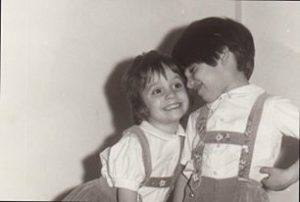People plan. God laughs.
[Delivered at Mt. Olive Presbyterian Church, July 14, 2019 & Temple Beth El, July 19, 2019. Based on Parashat Balak and Haftarah on Micah.]

“Der mensch tracht, un gott lacht – Man plans and God laughs.”
There’s a Yiddush expression: “Der Mensch Tracht, Un Gott Lacht – man plans and God laughs.”
While we go about planning our days and lives, we sometimes learn that God has another plan. That was the case with my birth. My dad, as a rabbi, struggled to make ends meet. He had three children when my mom got pregnant.
Here’s the telegram my father sent to my grandmother who was traveling when I was born. “Father of five yes that’s right we had twins one boy one girl. Bris next Thursday mother children in perfect shape. Love Alex.”
My dad then sent this letter to my grandmother in Munich and Majorca as she was travelling between both locations and he wanted to make sure it arrived. Here are excerpts: “Well, Rhea finally did it… she was slow but when she came through she came through in style… two for the price of one… that’s quite right… it will cost more.. but in a way it is an unexpected dividend.”
He then recalled the hospital experience as he had been through it three times before. He was in the waiting room for five, ten, fifteen, then twenty minutes and getting very nervous as that was a longer time than before. Finally, they called him to the delivery room which was unusual as they usually wheeled out the mother. The nurses assured him all was well. My dad said to the doctor: “Well, I guess it’s a boy!” “Look for yourself,” he said, and my dad nearly flipped. There were two where there should be one.
“Holy mackerel,” my dad said. Then remembering he was a rabbi, he made an emendation, “Holy Moses.”
My mom was beginning to emerge from the ether. He recalled the conversation:
Father: “It’s twins, honey.”
Mother: “Ha, ha, some joke.”
Father: “No, really, it’s twins.”
Mother: “Are you kidding?”
Father: “Look over here.. two… one boy and one girl, Really!”
Mother: “Doctor, put me back to sleep, wake me up in a half hour and tell me it’s only one.”
The letter concludes: “What am I doing with five kids? Only yesterday I was happy-go-lucky bachelor with nary a care in the world. But it is fun in a way and I am confident we will manage. Of course, I sent my boss, Eisendrath, a letter “urgently requesting a cost-of-living raise.” No response as yet. As long as we are healthy we will be happy and I hope you are too.”
People plan. God laughs.
The Biblical Joseph learned this lesson well.
The youngest of twelve sons, Joseph’s brother, threw him into an empty pit to kill him. Then his brothers sold him into slavery for a pocket full of coins. And finally, when Joseph attained a position of stature in Potiphar’s home, he was framed for sexual assault and imprisoned.
With each fall, Joseph rose to a higher place ultimately serving as Pharaoh’s right hand man.
After saving his brothers from famine, Joseph says to them: “Don’t be distressed for selling me here, it was to save lives that God sent me ahead of you.”
Joseph understood that his tragic circumstances enabled him to be in the right place at the right time to save his family.
People plan. God laughs.
This week’s parashah from the book of Numbers teaches that same lesson. King Balak of Moab fears the Israelites’ military strength and hires Bil’am, a non-Israelite prophet, to curse the Israelites. On three separate occasions, from three different summits overlooking the Israelites’ camp, Bil’am stops to share words of negative prophecy – but instead words of blessing come forth.
Bil’am utters words we now sing each morning as part of our liturgy: Mah tovu ohalecha Yaakov… How beautiful are your tents O Jacob, your dwelling places, O Israel.” Bil’am prophesizes our future success.
Bil’am was hired to curse the Israelites but God had another plan.
We have all witnessed misfortunes being transformed into blessings. The loss of a job leads to another job that makes a person happier. The breakup of a relationship leads to finding a soul mate. A forced move makes for a better life.
People plan and God laughs.
So what are we meant to do?
Perhaps we should consider starting not with our own plans but with God’s plan. Our haftarah from Micah offers wisdom.
“Listen to what God says,” the 8th and 7th century BCE Judean prophet taught.
“Stand up and plead before the mountains…
For God has a case against his people.
God brought you out of Egypt.
God redeemed you from slavery.
God sent you leaders – Moses, Aaron, and Miriam.
“Remember,” Micah proclaimed, “What Balak king of Moab plotted,
And what Bil’am answered.”
“With what should we come before God?” Micah asks.
God doesn’t want our burnt offerings.
God doesn’t need thousands of rams as sacrifices…
God doesn’t want our first born children as atonement for our sins.
In today’s terms, God doesn’t want our petitions and prayers, our songs and psalms,
God doesn’t want our piety inside the sanctuary if it is coupled with apathy outside.
“God has shown you,” Micah proclaims, “What is good.”
and what God requires:
To act justly, to love mercy, to walk humbly with God.”
God’s plan isn’t for us to stay pent up in our sanctuaries pouring out our prayers.
God wants us to go out in the world: to pursue justice,
to welcome the stranger through immigrant justice,
to let the shackled go free through criminal justice,
to feed the hungry through economic justice,
to heal the sick through health care justice.
When Bil’am set out to curse the Israelites, three times he was stopped. The donkey he rode upon saw the angel God had sent to block him. The ass upon which Bil’am was riding saw more clearly than Bil’am himself.
People plan. God laughs.
Joseph was cast into pits and ascended to the highest level of Egyptian leadership.
People plan. God laughs.
Balak hired the Moabite prophet to curse Israel but words of blessing came forth.
People plan. God laughs.
We think we are going one way but life takes another turn.
To set us on a better path, Micah gives us three to do’s to add to our daily list:
Oseh mishpat – make sure there is justice. Ensure people’s cases are properly adjudicated – in criminal courts, in civil courts, in immigration courts.
Ohev chesed – love mercy. Abraham Joshua Heschel teaches that “Justice dies when dehumanized, no matter how exactly it may be exercised.”
V’hatznayah lechet im eloheicha – and walk humbly with God…”
Humility requires making space for others.
Since hurricane season has arrived, I close with a quick story about a religious man caught in rising floodwaters. A neighbor came in a truck and said, “I’ll drive you to safety.”
“No thanks” the man replied. “God will save me.”
The waters rose and the police came in a boat. The man declined again asserting, “God will save me.”
Then a helicopter hovered overhead as the man climbed to his roof.
“No need to lower the ladder,” the man cried out, “God will save me.”
Ultimately the man drowned.
Upon arriving in heaven the man demanded a response from God: “God, why am I here in heaven? I prayed trusting you would save me from the flood.”
“Yes, you did,” God replied, “And I sent you a truck, a boat and a helicopter. But you never got in.”
Though people plan and God laughs, we cannot wait for God’s plan to unfold.
Judaism teaches, “Pray as if everything depended on God, act as if everything depends upon you.”
Do not say God will save others, for God needs you and others need you: to pursue justice, to love mercy, and to walk humbly.
[Blog featured photo by Glenn Carstens-Peters.]



No Comments